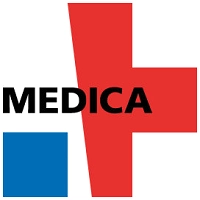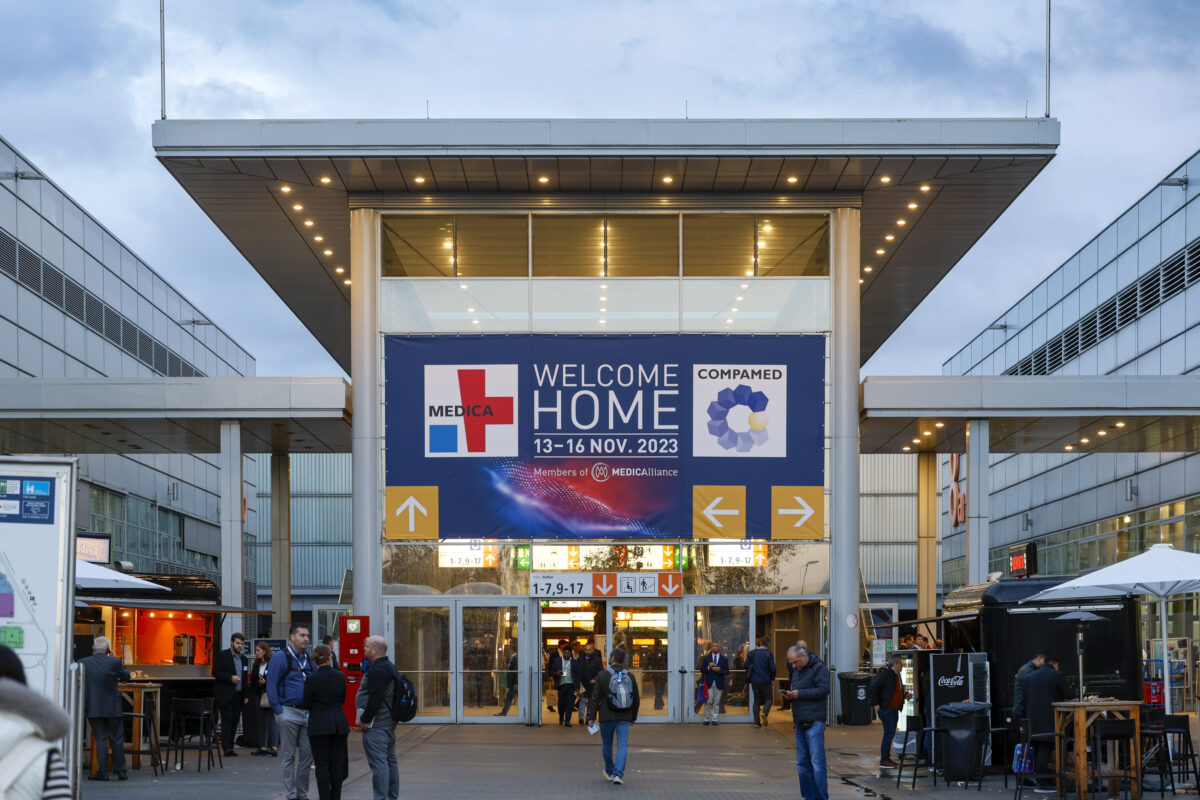
Latest NEWS
Revolutionizing Healthcare: Unveiling the Top 5 Key Trends at MEDICA Düsseldorf 2024

Digital Health and Telemedicine Solutions at MEDICA Düsseldorf 2024
Revolutionizing Healthcare: Unveiling the Top 5 Key Trends at MEDICA Düsseldorf 2024
Digital Health and Telemedicine Solutions at MEDICA Düsseldorf 2024
 In recent years, the healthcare industry has witnessed a remarkable transformation, driven by advancements in technology. The integration of digital health and telemedicine solutions has revolutionized the way healthcare is delivered, making it more accessible, efficient, and patient-centered. As we look ahead to MEDICA Düsseldorf 2024, one of the world’s leading trade fairs for the medical industry, it is evident that digital health and telemedicine will take center stage. Let’s explore the top five key trends in this field that will be unveiled at the event.
In recent years, the healthcare industry has witnessed a remarkable transformation, driven by advancements in technology. The integration of digital health and telemedicine solutions has revolutionized the way healthcare is delivered, making it more accessible, efficient, and patient-centered. As we look ahead to MEDICA Düsseldorf 2024, one of the world’s leading trade fairs for the medical industry, it is evident that digital health and telemedicine will take center stage. Let’s explore the top five key trends in this field that will be unveiled at the event.
Firstly, artificial intelligence (AI) is set to play a pivotal role in shaping the future of healthcare. AI-powered algorithms have the potential to analyze vast amounts of medical data, enabling healthcare professionals to make more accurate diagnoses and treatment decisions. At MEDICA Düsseldorf 2024, attendees can expect to see cutting-edge AI solutions that enhance clinical decision-making, improve patient outcomes, and streamline administrative tasks.
Secondly, the Internet of Things (IoT) will continue to transform healthcare delivery. Connected devices, such as wearables and remote monitoring systems, enable real-time data collection and analysis, empowering patients to actively participate in their own care. At the trade fair, visitors will have the opportunity to explore IoT-enabled devices that monitor vital signs, track medication adherence, and facilitate remote consultations, ultimately improving patient engagement and reducing healthcare costs.
Thirdly, virtual reality (VR) and augmented reality (AR) technologies are poised to revolutionize medical training and patient education. VR simulations provide healthcare professionals with immersive learning experiences, allowing them to practice complex procedures in a safe and controlled environment. Similarly, AR applications enhance patient education by overlaying digital information onto real-world objects, making it easier for patients to understand their conditions and treatment options. MEDICA Düsseldorf 2024 will showcase the latest advancements in VR and AR, offering attendees a glimpse into the future of medical education and patient empowerment.
Fourthly, blockchain technology is gaining traction in the healthcare sector, promising enhanced security, privacy, and interoperability of health data. By decentralizing data storage and ensuring its immutability, blockchain can facilitate secure sharing of medical records, enable seamless interoperability between different healthcare systems, and protect patient privacy. At the trade fair, experts will discuss the potential applications of blockchain in healthcare and showcase innovative solutions that address the industry’s data management challenges.
Lastly, telemedicine has emerged as a game-changer in healthcare delivery, particularly in remote and underserved areas. Through video consultations, remote monitoring, and telehealth platforms, patients can access quality healthcare services without the need for physical visits. MEDICA Düsseldorf 2024 will feature telemedicine solutions that bridge the gap between patients and healthcare providers, enabling remote diagnosis, treatment, and follow-up care. This trend is expected to have a profound impact on healthcare accessibility and equity, making quality care available to all, regardless of geographical location.
In conclusion, digital health and telemedicine solutions are transforming the healthcare landscape, and MEDICA Düsseldorf 2024 will showcase the top five key trends in this field. From AI-powered algorithms to IoT-enabled devices, VR and AR technologies, blockchain applications, and telemedicine solutions, the trade fair will provide a comprehensive overview of the latest advancements in healthcare technology. As we embrace these innovations, we can look forward to a future where healthcare is more personalized, efficient, and accessible to all.
AI and Machine Learning in Medical Diagnostics at MEDICA Düsseldorf 2024
AI and Machine Learning in Medical Diagnostics at MEDICA Düsseldorf 2024
The field of healthcare is constantly evolving, with new technologies and innovations being introduced every year. One of the most exciting developments in recent years has been the integration of artificial intelligence (AI) and machine learning in medical diagnostics. This trend is set to take center stage at MEDICA Düsseldorf 2024, one of the world’s largest trade fairs for the medical industry.
AI and machine learning have the potential to revolutionize medical diagnostics by improving accuracy, efficiency, and patient outcomes. These technologies can analyze vast amounts of data and identify patterns that may not be apparent to human clinicians. By leveraging this data-driven approach, healthcare professionals can make more informed decisions and provide personalized treatment plans for their patients.
At MEDICA Düsseldorf 2024, attendees can expect to see a wide range of AI and machine learning applications in medical diagnostics. One key trend is the use of AI algorithms to interpret medical images, such as X-rays, CT scans, and MRIs. These algorithms can quickly analyze images and detect abnormalities or signs of disease, allowing for earlier and more accurate diagnoses. This technology has the potential to significantly reduce the time and cost associated with traditional image interpretation methods.
Another exciting development in this field is the use of AI and machine learning to predict patient outcomes. By analyzing patient data, such as medical history, lab results, and genetic information, these technologies can identify patterns and make predictions about a patient’s likelihood of developing certain conditions or responding to specific treatments. This information can help healthcare professionals tailor treatment plans to individual patients, improving outcomes and reducing the risk of adverse events.
In addition to improving diagnostic accuracy and predicting patient outcomes, AI and machine learning can also play a crucial role in drug discovery and development. These technologies can analyze vast amounts of data, including scientific literature, clinical trial results, and genetic information, to identify potential drug targets and predict the efficacy of new treatments. By streamlining the drug discovery process, AI and machine learning have the potential to accelerate the development of new therapies and improve patient access to life-saving medications.
Furthermore, AI and machine learning can also be used to enhance the efficiency of healthcare operations. These technologies can analyze patient data and identify trends or patterns that may indicate inefficiencies or areas for improvement. For example, AI algorithms can analyze patient flow data to optimize scheduling and resource allocation, reducing wait times and improving patient satisfaction. By automating routine tasks and streamlining workflows, AI and machine learning can free up healthcare professionals to focus on more complex and critical aspects of patient care.
In conclusion, AI and machine learning are set to revolutionize medical diagnostics at MEDICA Düsseldorf 2024. These technologies have the potential to improve diagnostic accuracy, predict patient outcomes, accelerate drug discovery, and enhance the efficiency of healthcare operations. By harnessing the power of data and advanced algorithms, healthcare professionals can provide more personalized and effective care to their patients. As the field continues to evolve, it is crucial for healthcare professionals to stay informed about the latest trends and developments in AI and machine learning in order to provide the best possible care for their patients.
Wearable Healthcare Technology at MEDICA Düsseldorf 2024
Wearable healthcare technology has emerged as a game-changer in the healthcare industry, and the MEDICA Düsseldorf 2024 conference showcased the latest advancements in this field. With the aim of revolutionizing healthcare, the conference unveiled the top 5 key trends in wearable healthcare technology that are set to transform the way we approach healthcare.
First and foremost, the integration of artificial intelligence (AI) in wearable devices was a major highlight at MEDICA Düsseldorf 2024. AI-powered wearables have the ability to collect and analyze vast amounts of data, providing valuable insights into an individual’s health. These devices can monitor vital signs, detect abnormalities, and even predict potential health issues. The integration of AI in wearables not only enhances the accuracy of health monitoring but also enables personalized healthcare solutions.
Another trend that caught the attention of attendees at MEDICA Düsseldorf 2024 was the development of smart clothing. Smart clothing incorporates sensors and other electronic components into everyday garments, allowing for continuous health monitoring without the need for additional devices. These garments can track heart rate, body temperature, and even detect falls or irregular movements. The convenience and comfort offered by smart clothing make it an attractive option for individuals seeking seamless healthcare monitoring.
In addition to AI and smart clothing, the conference also showcased the advancements in wearable devices for chronic disease management. Wearable devices such as insulin pumps, continuous glucose monitors, and smart inhalers are transforming the lives of individuals with chronic conditions. These devices not only provide accurate and real-time data but also enable remote monitoring by healthcare professionals. This allows for timely interventions and personalized treatment plans, ultimately improving the quality of life for patients.
Furthermore, the integration of virtual reality (VR) and augmented reality (AR) in wearable healthcare technology was a topic of great interest at MEDICA Düsseldorf 2024. VR and AR have the potential to revolutionize medical training, patient education, and even surgical procedures. By immersing healthcare professionals and patients in virtual environments, these technologies enhance learning, improve patient outcomes, and reduce the risk associated with complex procedures. The integration of VR and AR in wearables opens up new possibilities for healthcare delivery and education.
Last but not least, the conference highlighted the importance of data security and privacy in wearable healthcare technology. As wearables collect and transmit sensitive health data, ensuring the security and privacy of this information is paramount. MEDICA Düsseldorf 2024 showcased the latest advancements in data encryption, secure cloud storage, and user authentication to address these concerns. By prioritizing data security, wearable healthcare technology can gain the trust of both healthcare professionals and patients, paving the way for widespread adoption.
In conclusion, wearable healthcare technology is poised to revolutionize the way we approach healthcare, and the MEDICA Düsseldorf 2024 conference unveiled the top 5 key trends in this field. From the integration of AI and smart clothing to the advancements in chronic disease management and the integration of VR and AR, these trends are set to transform healthcare delivery and improve patient outcomes. However, it is crucial to prioritize data security and privacy to ensure the widespread adoption of wearable healthcare technology. With these advancements, the future of healthcare looks promising, and we can expect to see significant improvements in patient care and overall health outcomes.
Personalized Medicine and Genomic Innovations at MEDICA Düsseldorf 2024
Revolutionizing Healthcare: Unveiling the Top 5 Key Trends at MEDICA Düsseldorf 2024
Personalized Medicine and Genomic Innovations at MEDICA Düsseldorf 2024
In recent years, the field of healthcare has witnessed remarkable advancements, thanks to the rapid progress in technology and research. One of the most exciting areas that has gained significant attention is personalized medicine and genomic innovations. At MEDICA Düsseldorf 2024, the world’s leading trade fair for the medical industry, these trends took center stage, showcasing the potential to revolutionize healthcare as we know it.
Personalized medicine, also known as precision medicine, is an approach that tailors medical treatment to an individual’s unique characteristics, including their genetic makeup, lifestyle, and environment. This emerging field holds immense promise in improving patient outcomes and reducing healthcare costs. At MEDICA Düsseldorf 2024, numerous exhibitors showcased groundbreaking technologies and solutions that are set to transform personalized medicine.
One of the key highlights was the advancements in genomic innovations. Genomics, the study of an individual’s complete set of DNA, has opened up new possibilities for understanding diseases at a molecular level. With the advent of next-generation sequencing technologies, it is now possible to analyze an individual’s genetic information quickly and cost-effectively. This has paved the way for targeted therapies and personalized treatment plans based on a patient’s genetic profile.
At MEDICA Düsseldorf 2024, attendees witnessed the unveiling of cutting-edge genomic sequencing platforms that offer unprecedented accuracy and speed. These platforms enable healthcare providers to identify genetic variations associated with diseases, allowing for early detection and intervention. Moreover, the integration of artificial intelligence and machine learning algorithms has further enhanced the interpretation of genomic data, enabling clinicians to make more informed decisions.
Another significant trend showcased at MEDICA Düsseldorf 2024 was the rise of direct-to-consumer genetic testing. These tests, which are easily accessible and affordable, allow individuals to gain insights into their genetic predispositions for various health conditions. With a simple saliva or blood sample, individuals can now uncover valuable information about their ancestry, potential risks for diseases, and even their response to certain medications.
While direct-to-consumer genetic testing has gained popularity, it also raises concerns regarding privacy and the interpretation of results. At MEDICA Düsseldorf 2024, experts addressed these concerns and emphasized the importance of genetic counseling to ensure individuals understand the implications of their test results. This personalized approach to genetic testing empowers individuals to make informed decisions about their health and well-being.
Furthermore, the integration of personalized medicine and digital health technologies was a prominent theme at MEDICA Düsseldorf 2024. The convergence of wearable devices, mobile applications, and electronic health records has enabled the collection of real-time data on an individual’s health status. This data, combined with genomic information, can provide a comprehensive picture of an individual’s health and guide personalized treatment plans.
The future of healthcare lies in the integration of personalized medicine and genomic innovations. The advancements showcased at MEDICA Düsseldorf 2024 have set the stage for a new era in healthcare, where treatments are tailored to an individual’s unique characteristics. With the potential to improve patient outcomes, reduce healthcare costs, and empower individuals to take control of their health, personalized medicine and genomic innovations are revolutionizing the way we approach healthcare. As we look ahead, it is clear that these trends will continue to shape the future of medicine, offering hope for a healthier and more personalized approach to healthcare for all.
Medical Robotics and Surgical Advancements at MEDICA Düsseldorf 2024
Revolutionizing Healthcare: Unveiling the Top 5 Key Trends at MEDICA Düsseldorf 2024
Medical Robotics and Surgical Advancements at MEDICA Düsseldorf 2024
The field of healthcare is constantly evolving, with new technologies and advancements revolutionizing the way we approach medical treatments. One of the most exciting areas of innovation is medical robotics and surgical advancements. At MEDICA Düsseldorf 2024, the world’s leading trade fair for the medical industry, several key trends in this field were unveiled, promising to transform the way surgeries are performed and patient outcomes are improved.
First and foremost, the integration of artificial intelligence (AI) into medical robotics has taken center stage at MEDICA Düsseldorf 2024. AI-powered robots are now capable of performing complex surgical procedures with unparalleled precision and accuracy. These robots can analyze vast amounts of patient data, identify patterns, and make real-time decisions during surgery, leading to safer and more efficient procedures. Surgeons can now rely on these intelligent machines to assist them in delicate operations, reducing the risk of human error and improving patient outcomes.
Another trend that has emerged at MEDICA Düsseldorf 2024 is the development of minimally invasive surgical techniques. Traditional open surgeries often involve large incisions, leading to longer recovery times and increased risk of complications. However, with the advent of robotic-assisted minimally invasive surgery, patients can now benefit from smaller incisions, reduced pain, and faster recovery. Surgeons can control robotic arms with precision, allowing for greater dexterity and maneuverability in tight spaces. This advancement in surgical techniques is set to revolutionize the field, making surgeries less invasive and more patient-friendly.
Furthermore, the use of virtual reality (VR) and augmented reality (AR) in surgical training and planning has gained significant attention at MEDICA Düsseldorf 2024. Surgeons can now immerse themselves in virtual environments, practicing complex procedures and honing their skills before stepping into the operating room. VR and AR technologies also enable surgeons to visualize patient anatomy in real-time during surgery, providing them with valuable insights and enhancing their decision-making process. This integration of virtual and augmented reality into surgical workflows is expected to improve surgical precision and reduce complications.
In addition to AI, minimally invasive surgery, and VR/AR, the field of medical robotics has also witnessed advancements in the area of robotic exoskeletons. These wearable devices are designed to assist patients with mobility impairments, allowing them to regain independence and improve their quality of life. At MEDICA Düsseldorf 2024, several companies showcased their latest exoskeleton prototypes, which offer enhanced comfort, flexibility, and ease of use. These devices have the potential to transform rehabilitation and enable patients with spinal cord injuries or neurological disorders to regain mobility and functionality.
Last but not least, the field of medical robotics and surgical advancements has seen significant progress in the area of telemedicine. With the increasing demand for remote healthcare services, telemedicine has become an essential tool in providing medical care to patients in remote areas or those unable to visit a healthcare facility. At MEDICA Düsseldorf 2024, telemedicine platforms that integrate medical robotics were showcased, enabling doctors to remotely control robotic devices and perform procedures from a distance. This technology has the potential to bridge the gap between patients and healthcare providers, ensuring access to quality care regardless of geographical limitations.
In conclusion, the field of medical robotics and surgical advancements is undergoing a transformative phase, as showcased at MEDICA Düsseldorf 2024. The integration of AI, minimally invasive surgery, VR/AR, robotic exoskeletons, and telemedicine is set to revolutionize the way surgeries are performed and patient care is delivered. These advancements promise safer procedures, faster recovery times, improved surgical precision, and enhanced accessibility to healthcare services. As we move forward, it is clear that medical robotics will continue to play a pivotal role in shaping the future of healthcare.





